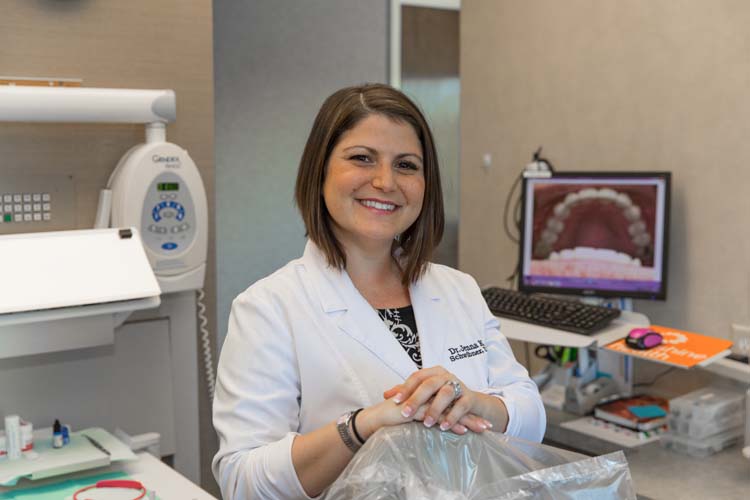
Everybody knows – or thinks they know – what to expect from a trip to the dentist. But Dr. Jenna Katz Schwibner at Dental Partners of Vero Beach is quick to point out there’s a lot more to modern dentistry than just a twice-a-year cleaning and filling cavities.
Like, for instance, saving your life.
Life-saving and dentistry might sound like a big slice of hyperbole pie from an American Dental Association advertising campaign, but it’s not.
According to the Centers for Disease Control, more than a quarter of the U.S. population suffers from some kind of sleep disorder, and the National Institutes of Health estimates about 18 million Americans have a potentially lethal affliction called “obstructive sleep apnea,” or OSA.
The American Journal of Respiratory and Critical Care has linked OSA to an increased risk for developing diabetes, depression, memory loss or confusion, sexual dysfunction, high blood pressure, weight gain and, yes, fatal strokes.
“OSA occurs when your throat muscles over-relax, causing the airway to collapse, blocking proper airflow, and temporarily preventing you from breathing,” according to toothwisdom.org, a website specializing in oral care for older adults. “When breathing is interrupted your body reacts by increasing your heart rate in order to maintain proper oxygen levels. Over time, this may cause other changes to your body and lead to poor breathing and increased carbon dioxide levels.”
And it turns out dentists are in a good position to spot the signs and symptoms of this serious condition that doctors might not always pick up on.
“It’s getting to the point now where dentists are becoming part of the first line defense with sleep apnea,” Schwibner says. “We’re one of the primary practitioners to help with it.”
Schwibner continues: “When people see their medical doctor, it’s often more of a sick visit. They see their doctor only when they’re not feeling well. But the majority of our patients aren’t in pain when they come in. They’re just getting their teeth cleaned and getting maintenance and so we see people a lot longer.”
Schwibner says patients “don’t typically think that they’re sick when they have sleep apnea. A lot of times they have no idea they have it. It’s a silent killer, if you will. If we can notice these things on regular check-ups, that’s a really big advantage, and then we can get them in to see their doctor.”
The diminutive Schwibner is quick to add “a dentist cannot tell a patient or diagnose that they have sleep apnea. You always need a sleep study to confirm the diagnosis,” but there are signs a dentist is likely to spot that a primary care doctor, a cardiologist or other specialist might not notice immediately.
For example, “a lot of people, they stick out their tongue and they actually have little indentations on the side of their tongue. We call that a scalloped tongue. It goes into the indentations all around the teeth on the inside and 81 percent of people who have that have some form of sleep apnea. And that’s something that only a dentist would see.”
Likewise, people who grind their teeth at night; Schwibner says teeth grinding is “a big sign for us” that they might well have OSA.
And while OSA is most common in men, it is something of an equal-opportunity health threat. Especially as we age. Postmenopausal women, says Schwibner, are at as high risk as men and the problem is often compounded by the use of sleeping pills.
“The sleeping pill keeps you from waking up due to sleep apnea. It’s actually hurting you even more because your body is trying to wake you up for a reason. It’s trying to warn you, like, ‘Hey, wake up. Breathe.’ And if you’re taking sleeping pills, that response isn’t there anymore.”
While Continuous Positive Airway Pressure or CPAP machines are “always the first line” of defense for OSA patients, according to Schwibner, fully half of patients find they cannot tolerate using those devices.
Fortunately, dentists like Schwibner who are trained in sleep apnea management can provide an alternative: a “mandibular repositioning dental appliance.” The American Academy of Dental Sleep Medicine calls these “an effective treatment option for snoring and obstructive sleep apnea,” for those who cannot tolerate a CPAP machine, but there is an important caveat here.
TV commercials have begun offering devices people can order by phone or online, but Schwibner warns not only are these not custom-fitted, they’re “not something that has any medical research backing or any studies showing [their] efficacy. It’s definitely not something that we recommend.”
Schwibner, whose local roots run through Sebastian River High School, Vanderbilt University and Nova Southeastern’s College of Dental Medicine, is the daughter of longtime Vero Beach anesthesiologist Dr. Edward Katz.
Dr. Jenna Schwibner is with Dental Partners of Vero Beach at 3755 7th Terrace, Suite 303. The phone number is 772-569-4118.



